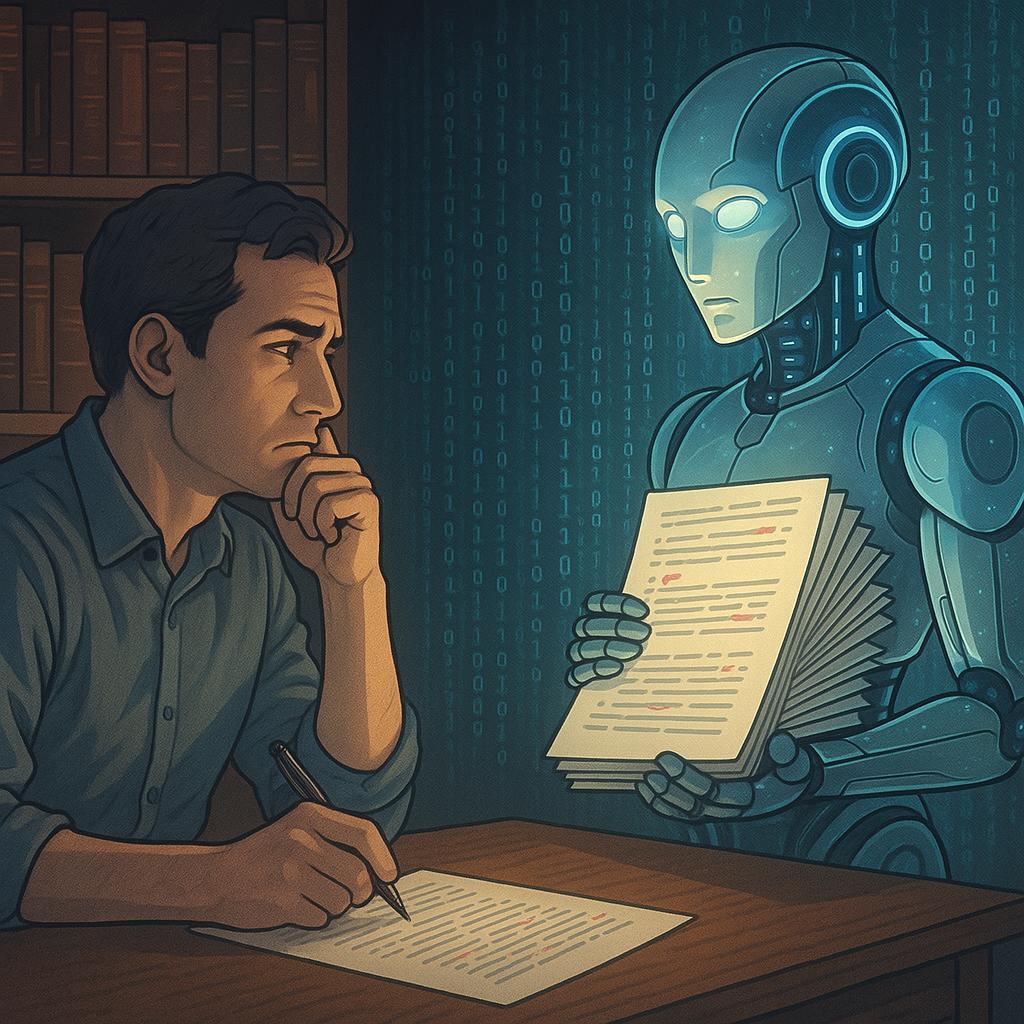The integration of AI-powered writing tools is transforming the writing profession, with artificial intelligence now a routine partner rather than a distant threat. Writers in the industry navigate a reality where the boundaries between original creation and editorial work are increasingly blurred.
Below, we examine several possible scenarios for writing as a skill in the age of AI. Each scenario reflects real changes underway. Some writers find themselves adapting to new editorial roles, others focus on maintaining a human voice, and many are combining creativity with the strengths of automation.
Although we speculate about a future, it is clear that multiple scenarios for the evolution of writing are already in motion.
The central question is no longer whether change will come, but which pathways will dominate and how writers will thrive amid this dynamic field.
Scenario 1: Writers Become Editors
As AI-generated text becomes more common, writers are shifting toward editing and refining machine-produced drafts.
Their work now centers on reviewing, fact-checking, and restructuring content to meet specific standards. Roles focus on improving accuracy, tone, and style rather than starting from a blank page.
Content suited for this editorial approach includes:
- News articles requiring strict factual accuracy
- Technical documentation where clarity and precision matter
- Product or service descriptions for websites
- Content marketing pieces that must maintain brand voice
Writers spend more time analyzing drafts, identifying errors, and improving readability. Editing skills like critical reading, adaptability, and subject expertise are essential in this process.
Final products still need a human perspective to maintain quality and avoid bias introduced by algorithms.
Scenario 2: Human Writing Becomes Premium
Human-created content is gaining recognition as a premium product in specific markets.
Audiences and clients looking for depth, originality, and a personal touch are willing to pay more for writing that demonstrates original perspective or storytelling skill.
This shift is especially noticeable in areas where authenticity and emotional connection are vital.
Types of content that benefit from premium human writers include:
- Memoirs or personal essays sharing lived experience
- Opinion columns and critical reviews
- Literary fiction and poetry with distinct voices
- Long-form investigative journalism
Writers in these specialized areas connect with readers by delivering thoughtful insights, empathy, and specific cultural perspective. Their content stands apart because readers value the feeling of genuine human presence.
Scenario 3: Writers Turn into Prompt Engineers
Writers are mastering the skill of crafting effective prompts to guide AI systems in producing quality content.
They design precise instructions for language models and shape outputs with targeted detail and tone.
This new role demands clarity, strategic thinking, and a deep understanding of both the subject and how AI responds to input.
Content types suitable for prompt engineering:
- Social media posts needing brand consistency
- Automated email responses with personalized touches
- Blog outlines and drafts for efficiency
- Generating creative ideas or brainstorming lists
Prompt engineers troubleshoot and refine prompts to get the best possible results, usually running several iterations before reaching the desired style or substance.
The emphasis is on controlling output and maintaining standards with each project.
Scenario 4: The Creative Rebellion Against AI
Writers push back against widespread automation by emphasizing distinctly human qualities in their work. Instead of relying on AI tools, they lean into experimentation, risk-taking, and diverse formats that challenge algorithmic patterns.
These creators prefer processes that AI cannot easily replicate, such as improvisational writing, mixed media storytelling, or collaborative zines.
Content best suited for this approach:
- Experimental fiction and poetry that challenges literary conventions
- Interactive stories mixing text, visuals, or audio
- Crowdsourced writing projects with unpredictable outcomes
- Local cultural journalism colored with community voices
Writers in this space attract a niche audience who look for authenticity and a handmade touch.
Their work thrives in spaces where there’s a lasting interest in unfiltered, personal art: print magazines, indie publishing, and micro-communities on social media.
Scenario 5: Hybrid Roles Dominate
Professionals juggle both writing and editing as part of their daily workflow. Instead of focusing on just one task, they mix content creation, AI guidance, and quality checks in a single project.
This approach lets them adapt quickly to changing needs and tools.
Hybrid roles include tasks from all previous scenarios (edit drafts, write original content, craft prompts, and apply creative methods), depending on the project demands:
- Blogs that use AI for drafting and humans for refinement
- Social media campaigns built with prompts, edits, and original input
- News articles with AI-generated drafts and human fact-checking
- User guides combining clear step-by-step instructions with up-to-date AI content
- Opinion pieces structured by AI but shaped by human voice
- Podcasts and video scripts that mix original writing with AI-assisted polish
- Educational content that pairs original lessons with AI-generated example
The Economic and Career Implications
AI’s influence over writing jobs affects earning potential and long-term stability for content creators.
Demand for basic copy and generic web content has changed, driving rates down for routine writing. Editors and prompt engineers now see steadier work, especially where quality control or customized messaging matters.
Meanwhile, premium writers and creative experimenters can command higher fees, but landing these jobs requires stronger portfolios and a clear personal brand.
The market increasingly values those who can:
- Work within multiple roles
- Collaborate with tech
- Shift quickly to meet new client needs
| Role | Economic Trend | Key Skill Needed |
|---|---|---|
| Editor/Fact-checker | Stable or growing demand | Attention to detail |
| Premium writer | Higher rates in niche markets | Voice and storytelling |
| Prompt engineer | Growing demand | Strategic input design |
| Hybrid worker | Flexibility increasingly valued | Multi-tasking |
Summary
There are several possible directions for writing as a skill in an AI-driven future. All of them are already playing out to varying degrees; which one will prevail remains to be seen
1. Writers as Editors
Writers focus on refining AI-generated drafts. They correct errors, improve clarity, and adjust tone to meet quality standards.
2. Human Writing as Premium
Human-created content holds higher value in areas that demand voice, emotion, and originality, such as essays, fiction, and reviews.
3. Writers as Prompt Engineers
Writers design precise prompts to guide AI output. They shape structure, tone, and detail through clear input.
4. The Creative Rebellion
Writers reject automation by producing original, hands-on, and unpredictable work that AI struggles to imitate.
5. Hybrid Roles
Writers combine editing, original writing, prompt design, and creative input in flexible, multi-skill workflows.
While no single future has won out, one thing is clear: writing is not ending; it’s being redefined. Adapting to changes through skill development and flexibility helps writers pursue stable, satisfying careers. AI is a tool: those who learn to wield it alongside traditional skills will have the most options and influence in the job market.



